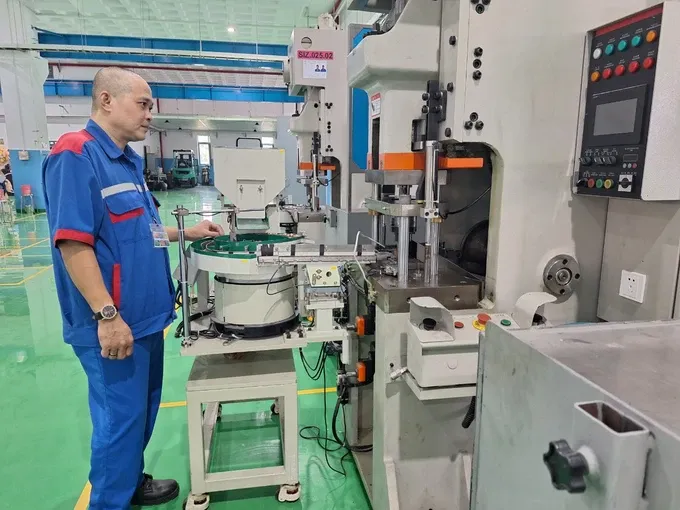
In 2014, when Samsung Group announced a list of 170 parts necessary to assemble its products of Galaxy S4 and Tab, no Vietnamese companies in the supporting industry were able to answer the call. Ten years have passed by, and now the situation is opposite, when 250 domestic businesses in this industry are capable of providing needed parts to Samsung Group. A fifth of them are even considered level-1 suppliers. Similar stories can be found among the part suppliers for Toyota Vietnam, Sanyo, Panasonic.
With a clear aim of entering international supply chains, a large number of Vietnamese enterprises in the supporting industry have been carrying out renovations in their manufacturing technologies to answer the high demands of their current as well as potential partners.
For instance, Duy Khanh Engineering Co. Ltd. has just poured in VND200 billion (US$8.15 million) to purchase a large-scale advanced metal powder pressing and sintering line to supply various businesses. It has also upgraded its existing assembly lines to meet the standards of renowned corporations like Toshiba Industry, Rinnai, MK Seiko, Bonfiglioli, Thermtrol, Sanei Technology, USM Health Care. With these preparations, the company is now able to either produce items according to its partners’ designs or conduct research for new products of its own. This will ultimately raise the prestige of the company globally.
According to Dien Quang Group, for a more sustainable development of the supporting industry, it is advisable to invest in research and manufacturing core technological items. In 2007, the company allocated money to construct its hi-tech factory, a research and development center, a quality control lab while also focusing on the Original Equipment Manufacturer (OEM) side to produce modern LED chips for smart control and equipment. Thanks to that, there was no disruption in its supply chain even during the Covid-19 pandemic.
To better adapt to international corporations, many domestic businesses study the working culture of their partners and targeted supply chains.
Obviously, the proactiveness of Vietnamese enterprises in the supporting industry to join in global supply chains have become quite fruitful. However, more work should be done for them to reach the leading positions and eventually form ‘Make in Vietnam’ supply chains, meaning to be strategic suppliers of FDI businesses.
Chairman of the HCMC Mechanical and Electrical Businesses Association Do Phuoc Tong shared that despite certain successes in the investment and manufacturing capacity, almost all companies in the supporting industry in Vietnam are merely small and micro enterprises with a labor scale of about 300 employees. Their manufacturing lines are mostly semi-automatic.
Due to their scale, it is not at all easy for them to expand or upgrade their production technologies. What is more, they are so sensitive that even a minor policy might either boost them or turn them into chaos.
Take the case of Minh Man Manufacturing and Printing Labels Co. Ltd. as an example. After 20 years of operation, the company based on HCMC’s investment stimulus program to renovate itself. Unluckily, this program was stopped mid-way, and it cannot enjoy preferential loan rates anymore. Adding to that is a global price increase in input material, creating more challenges for the company.
Another problem comes from inadequate tax policies. Foreign businesses can enjoy an import tax rate of zero percent when bringing new technologies into Vietnam, whereas domestic enterprises have to pay high tax rates when buying cutting edge manufacturing technologies. This leads to a low competitive status of Vietnamese companies as opposed to their international counterparts.
Clearly, besides actively trying to renovate themselves, businesses in the supporting industry are in need of proper financial aid (tax policies, preferential loan rates) from the state in order to join in supply chains of FDI corporations.
Statistics from QIMA Quality Control Services reveal that Vietnamese supporting enterprises are a favorable choice of many corporations in the US and Europe, with the figures being 43 percent and 25 percent respectively. 38 percent of US businesses and 28 percent of European ones shared that they have a plan to seek Vietnamese suppliers to provide necessary items for their end-products in the next 12 months.
























